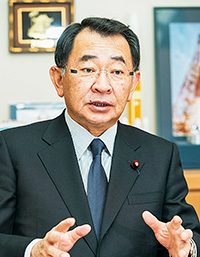
On January 14, the cabinet approved the fiscal 2015 budget proposal of 96,342 billion yen, the largest amount ever on the General Account. To ensure a "virtuous economic cycle," the government and the ruling coalition look for early passage of the proposal, following the fiscal 2014 supplementary budget proposal during the ordinary session of the Diet that will convene on January 26. We spoke with Ryu Shionoya, the Acting Chairperson of the Party's Policy Research Council who led the Party's budget debates, on the key points and the challenges that lie ahead.
Fiscal 2015 budget proposal
-- What is unique about the fiscal 2015 budget proposal?
Ryu Shionoya, Acting Chairperson, LDP Policy Research Council: In last year's general election, we identified economic revitalization as the Party's highest priority, and that idea received overwhelming support from the Japanese people. The budget proposal reflects this, and is designed to ensure the success of Abenomics.
The first step is to reinvigorate the economy and to create an environment in which we are able to increase the consumption tax. This will be a coordinated package of economic stimulus, supplementary spending, and tax system revisions that will provide quick, seamless support at the proper timing for the achievement of both economic revitalization and fiscal rebuilding.
As the economy recovers, revenue from corporate income taxes and other sources will increase, and these high levels of revenue will enable us to keep new government bond issuance below ¥40 trillion for the first time in six years. This will reduce the red ink on the "primary balance" - a measure of how well tax revenue is able to cover policy spending. In fact, the deficit of the central and local governments combined is expected to be cut down to half during the new fiscal year. Thanks to the economic policies enacted by the Abe government, we are seeing more and more bright signs in our economy.
-- Tell us about some of the individual policy items.
Shionoya: One focus is social security spending, which will cross the 31 trillion yen line for the first time due to the aging population. The Ministry of Finance demanded a reduction of approximately 3% from revisions to nursing care service fees.
Nursery fees are regularly reviewed and reduced, but the largest reduction in the past was 2.3% in fiscal 2003, and there are concerns that it would disrupt nursing care if we were to exceed this, so the final negotiation resulted in a reduction of 2.27%. Even then, we have tried to modulate the reduction to accommodate the current circumstance. Compensation to nursing service operators will be reduced by 4.48%, but wages for nursing care workers, where shortages could be a problem, will be increased by more than 10,000 yen.
We also have a program to support early childhood education and reduce the burdens on low-income households. Hakubun Shimomura, the Minister of Education, Culture, Sports, Science and Technology, aims for a free early childhood education plan by 2020, and this is a first step towards that goal. Nonetheless, we need to accelerate the discussion on funding. I head the Party's Policy Division on Educational Investment and Funding, and we plan to put together a concrete proposal very soon. The linkage to the "Comprehensive Support System for Children and Child rearing" that will begin in April is also an issue we need to address.
-- Among the key focuses in the budget are new goals such as regional development and expanding opportunities for women.
Shionoya: With respect to regional development, in the past, it has been common to wait until the central government offers support, but I think it will be important for local communities to take a more proactive stance by fleshing out good ideas and generating their own proposals.
For example, in my district in Hamamatsu City, Shizuoka Prefecture, we have a great deal of manufacturing technology that we've built up over the years, and we are now working to improve how the commercial and industrial sectors coordinate with both agriculture and health care.
We are also ranked 4th among all Japanese cities for agricultural production, and there is potential for further growth by developing new sales channels in Japan and also in international markets. On the tourism side, this year marks the 400th anniversary of the death of Tokugawa Ieyasu, the founder of Tokugawa Shogunate, and we are planning commemorative events in collaboration with Shizuoka City and Okazaki City (Aichi Prefecture). Ieyasu lived longer in Hamamatsu city than anywhere else, and it was here that he built the foundations of his power.
Each region and community has its own distinctive features and attractions, its own strengths that others cannot mimic. I think the key to success will be to work in close coordination with the central government to leverage those strengths into sustainable growth for the community.










